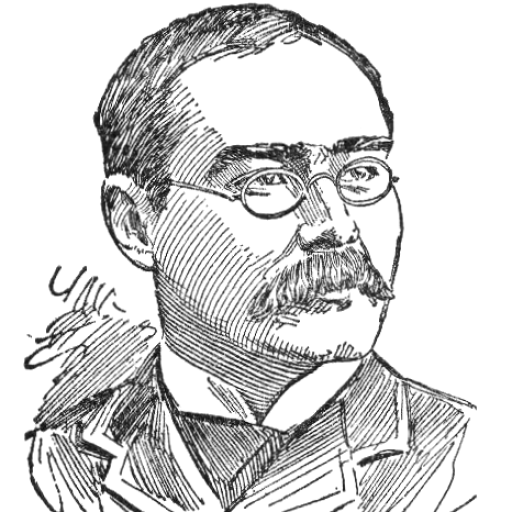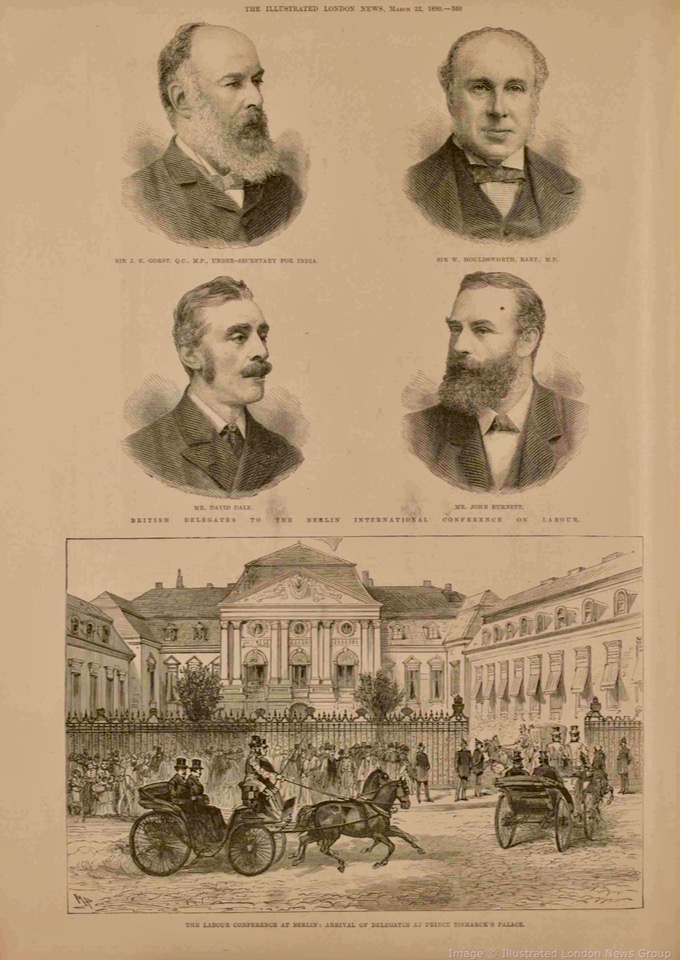We will work for ourselves and a woman, for ever and ever, amen …
In an effort to appease the powerful Social Democrats in the Reichstag, the German Chancellor Otto Bismarck hosted in Berlin the first international labour conference (March 1890). The aim was to agree some on some minimum international labour standards while still benefitting from competitive free trade. This and successive conferences led to the creation of the International Labour Organisation in 1919.
Most western European governments sent official delegations to the 1890 conference. The picture above is from the Illustrated London News of 22 March 1890 and shows four of the members of the British delegation that included ministers and members of parliament, supported by expert advisers from industry and trade unions. The conference agreed in principle on the international regulation of the work of women, children, and miners with a weekly day of rest for all workers but determined no practical steps to implement them.
Imperial Rescripts were decrees issued directly by the German Emperor; in this case it was an invitation to other European countries to come to Berlin to discuss improvement in the labour conditions of the working classes. Kipling, for his part, was as biased against the Kaiser as he was against socialism. In the present poem he took the occasion of the conference to ridicule the Marxist utopia of “from each according to his ability, to each according to his needs”.
Even the title is sarcastic: a “rescript” is an imperial decree; at the same time, “re-script” literally means “re-writing”, in this case the re-writing of human nature.
An Imperial Rescript
Now this is the tale of the Council the German Kaiser decreed, To ease the strong of their burden, to help the weak in their need; He sent a word to the peoples, who struggle, and pant, and sweat, That the straw might be counted fairly and the tally of bricks be set. (1) The Lords of Their Hands assembled. (2) From the East and the West they drew - Baltimore, Lille, and Essen, Brummagem, Clyde, and Crewe. And some were black from the furnace, and some were brown from the soil, And some were blue from the dye-vat; but all were wearied of toil. And the young King said: - "I have found it, the road to the rest ye seek: "The strong shall wait for the weary, the hale shall halt for the weak: "With the even tramp of an army where no man breaks from the line, "Ye shall march to peace and plenty in the bond of brotherhood - sign!" The paper lay on the table, the strong heads bowed thereby, And a wail went up from the peoples: - "Ay, sign - give rest, for we die!" A hand was stretched to the goose-quill, a fist was cramped to scrawl, When - the laugh of a blue-eyed maiden ran clear through the Council-hall. And each one heard Her laughing as each one saw Her plain - Sadie, Mimi, or Olga, Gretchen, or Mary Jane. And the Spirit of Man That is in Him to the light of the vision woke; And the men drew back from the paper, as a Yankee delegate spoke: - "There's a girl in Jersey City who works on the telephone; "We're going to hitch our horses and dig for a house of our own, "With gas and water connections, and steam-heat through to the top; "And, W. Hohenzollern, I guess I shall work till I drop." (3) And an English delegate thundered: - "The weak an' the lame be blowed! "I've a berth in the Sou'-West workshops, a home in the Wandsworth Road; "And till the 'sociation has footed my buryin' bill, "I work for the kids an' the missus. Pull up! I'll be damned if I will!" And over the German benches the bearded whisper ran: - "Lager, der girls und der dollars, dey makes or dey breaks a man. "If Schmitt haf collared der dollars, he collars der girl deremit; "But if Schmitt bust in der pizness, we collars der girl from Schmitt." They passed one resolution: - "Your sub-committee believe "You can lighten the curse of Adam when you've lifted the curse of Eve. (4) "But till we are built like the angels - with hammer and chisel and pen, "We will work for ourselves and a woman, for ever and ever, amen." Now this is the tale of the Council the German Kaiser held - The day that they razored the Grindstone, the day that the Cat was belled, The day of the Figs from Thistles, the day of the Twisted Sands, (5) The day that the laugh of a maiden made light of the Lords of Their Hands.
Notes
[1] A reference to the Biblical story (Exodus 5:6-8) of the forced labor of the Children of Israel in Egypt, where they had to build the cities of Ramses without getting straw for making the bricks.
[2] Unlike typical lords, who are known by the names of the estates they own, Kipling erroneously assumed the delegates were workers, owners of nothing but their hand labor.
[3] The Kaiser’s name was Wilhelm Hohenzollern.
[4] God punished Adam and Eve for eating the forbidden fruit (Genesis 3:16-19) by ordering that Adam “shall eat bread by the sweat of his brow”, and that Eve “shall bear children in great pain” (hence menstruation is colloquially called “the curse”). Thus the resolution signifies that men will not have to toil when women will not have to labor.
[5] i.e. the day the socialist paradise came true, along with the other fairy tales.

